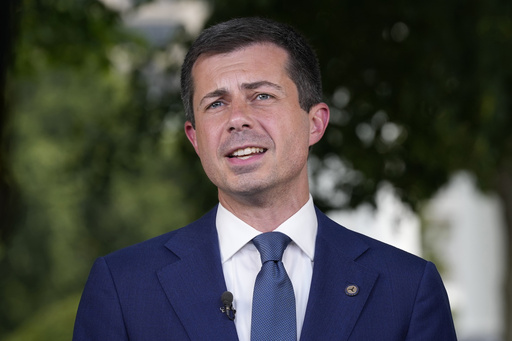
TRAVERSE CITY, Mich. — The Democratic Party is buzzing with the prospect that its next leader may be living in the quiet charm of this lakeside city. Pete Buttigieg, the former U.S. secretary of transportation and a key figure in the party, is at a crossroads. He is contemplating a significant decision regarding his political future—whether to join the race for Michigan’s U.S. Senate seat or pursue a larger ambition as a potential candidate for the presidency in 2028.
Buttigieg, who is 43, has been consulting with influential party officials, labor leaders, and strategists about his next move. There is mounting pressure to make a choice soon. Prominent members of his inner circle assert that managing both a Senate campaign in 2026 and a presidential run in 2028 is not a practical option. David Axelrod, a former strategist for Barack Obama, offered his insight, suggesting that juggling both ambitions would pose incredible challenges. He noted the current tumult in the Democratic Party, which is feeling vulnerable and searching for powerful new leadership amid fears regarding the political landscape under Donald Trump and others reshaping governmental priorities.
Despite the doubts, Buttigieg possesses potential tools that could prove advantageous if he chooses to make a national bid. More than four years have passed since he made waves during the Iowa caucuses, and he has since proven to be one of the party’s most effective communicators. With a substantial social media following, a robust network of national contributors, and an accessible Midwestern demeanor, he remains a figure of interest for Democrats hoping for a resurgence.
At the heart of his decision-making process is the impact on his family. Buttigieg is the openly gay father of twins and is navigating life as a public figure during a politically charged climate that has seen targeted attacks against LGBTQ+ rights and initiatives. As Buttigieg contemplates a return to the national stage, the safety of his family remains a primary concern for himself and his supporters.
Having stepped back from the national spotlight since leaving the Biden administration a month ago, Buttigieg has refrained from engaging extensively with media or public forums. His criticisms of Trump have primarily been expressed through social media. Nevertheless, his engagement generates significant responses, with his posts receiving millions of views. Recently, he has become notably more recognized in Traverse City, which is known as “the Cherry Capital of the World,” partly due to connections through his husband, Chasten Buttigieg, who grew up in the area.
Locals keep an eye on the former mayor of South Bend, Indiana, often sharing anecdotes of unexpected encounters with him. However, amidst the welcoming local environment, concerns about safety for LGBTQ+ individuals echo through the community. Events such as militia plots against Gov. Gretchen Whitmer raise alarms, leading local leaders to reflect on the harsh realities facing prominent Democrats today.
Critics of Buttigieg have suggested that he may have relocated to Michigan to further his political ambitions, with some labeling the area as an elite enclave—an assertion that doesn’t sit well with all locals. Yet, even with these criticisms, there are voices within the party that champion Buttigieg’s ability to challenge opponents based more on policies than personal attributes.
The political landscape presents a ripe opportunity for an ambitious Democrat. With the unexpected retirement of incumbent Senator Gary Peters, Michigan’s Senate seat becomes a coveted position. Michigan has not elected a Republican senator this century, elevating the stakes for any candidate choosing to contest this race. Additionally, the state is set to be critical in the upcoming presidential elections, offering strategic advantages for any candidate with Midwestern roots.
Influential figures, including recently retired Sen. Debbie Stabenow, have indicated strong support for Buttigieg, suggesting he would be a compelling candidate. Stabenow expressed confidence that should Buttigieg choose to run, he would quickly establish himself as a front-runner, pointing out his Midwestern sensibility as an asset.
Buttigieg is actively engaging with labor leaders and state political figures as he weighs his options. Conversations with allies emphasize the need for a well-reasoned approach as he considers his family’s needs and safety alongside his political ambitions.
Looking beyond Michigan, Buttigieg’s network continues to expand. Former New Hampshire Representative Annie Kuster has been in frequent contact with him, urging a Senate run. Kuster believes Buttigieg’s communication skills are crucial, especially in engaging with communities that Democrats may struggle to connect with. Whether he runs for Senate or seeks another route, many insiders recognize that his ability to draw attention and support remains significant.
In navigating these possibilities, Buttigieg finds himself weighing the options between returning to the Senate race and potentially eyeing a future presidential run, reflecting on the examples set by prior leaders like Obama, who successfully transitioned from Senate to the presidency in quick succession. As he sorts through his choices, one thing remains clear: the attention surrounding his forthcoming decision is palpable.

